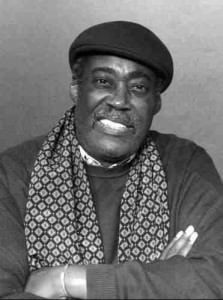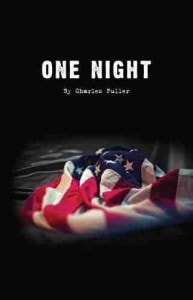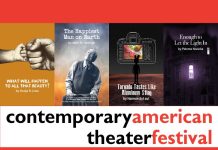This Special Edition of The Playwright’s Playground continues The Playmaker Series: CATF 2014. In a series of in depth conversations, I speak with the artistic teams associated with the plays at this year’s Contemporary American Theater Festival. Playwrights and the Directors share revealing behind the scene insights about their inspirations and the development of their new plays. It’s always refreshing and reaffirming to speak with artists who are not only passionate about the work they do, but are open about sharing their creative process and motivations.
Charles Fuller’s new play One Night takes the stage in only its second production, this time at this at The Contemporary Theatre Festival in Shepherdstown, West Virginia. The Festival ends tomorrow – Sunday, August 3rd, and this weekend is the final opportunity to see this play and the four other 2014 CATF productions.

Charles Fuller has been a recognized and acclaimed figure in American Theatre for more than forty years. He is best known as the 1982 PulitzerPrize-winning Playwright of A Soldier’s Play (1981), the searing military drama about racism, self-hatred, and personal responsibility. Fuller also wrote the screenplay of the filmed version, A Soldier’s Story which appeared in 1984 and was nominated for three Academy Awards. He became the second African American author (the first being Charles Gordon in 1970) to win the Pulitzer Prize.
Charles Fuller’s colorful life experiences have heavily influenced his body of work. All of his plays demonstrate a strong historical basis and personal authority. One can look to his early beginnings and an inspired talk with Ralph Ellison, to his college and theater education, and the impact of his military service, and his work as a Housing Inspector.
Fuller attended Villanova University and La Salle College and served in the U.S. Army from 1959 to 1962. In 1967 he co-founded the Afro-American Arts Theatre in Philadelphia, and he was the co-Director from 1967 to 1971. His first professionally produced play, The Village: A Party (1968), a drama about racial tensions among a community of racially mixed couples, launched his professional Playwriting career.
His works include: The Village: A Party (The Perfect Party); An Untitled Play; In My Many Names and Days; The Candidate; In the Deepest Part of Sleep; First Love (one-act); The Lay out Letter (one-act); The Brownsville Raid; Zooman and the Sign; A Soldier’s Play; We; Eliot’s Coming; One Night.
______
Sydney-Chanele: Charles, why do you write plays?
Charles: Plays have always been for me a way to look at the result of your work – almost instantaneously. A book, someone reads. You almost never know what someone feels about it unless you’ve sold 10,000 books in a week. When you watch a play being performed – I’m always in the audience at some point while the play is being done – you know almost instantaneously if you are succeeding or not because the audience does things. They squish around in their seats if they’re not happy, they cough, they talk to each other; they are not paying attention to what’s going on.
But if they are riveted to what’s going on the stage then it seems to me you’ve succeeded. Whether they come out whistling a tune or they say “gee, I hate it,” at least they are paying attention and you know what you have written has caught their attention. I always know in a very visceral way when my play is working or not by simply being there in the audience with the people.
That’s why I write plays. I know what I have created on the stage hopefully will make you pay attention – and I can find out right away.
What did you learn by attending the opening night production of One Night at the Contemporary American Theater Festival?
Well, some people liked it, but others people weren’t sure. I heard the applause and I watched the performance. I’m always aware that with serious matter you’re going to get people who disagree with what you’re doing -or, who don’t want to see that particular thing going on. And, I got that in that play and in that applause that occurred that night. The play was also done in New York and it got similar responses.
I don’t expect what I do or what I intend to do is going to get people jumping up and down and whistling tunes when they walk out of the theater. I write things serious enough for people to pay attention to. I am trying to deliver a message of some sort. Hopefully the people who were there in the theater came away saying, “what a horrible thing that’s happening to people in the military with this sexual assault. It’s terrible and maybe we ought to do something about it.” If that’s the response then I am very happy about that.
In speaking with Ed Herendeen, the Director of One Night, he told me that you’re always working on the play and that you’re still working on it. What are the changes you made for this CATF production and the differences since the Cherry Lane Theatre production in New York?
Yes. Well, one of the things we learned with the production in New York because it was on a smaller stage we didn’t have the opportunity to bring the apparitions the girl sees into view. We couldn’t do certain things on that stage that we could do on the larger stage at CATF.
Also, some of the things that seemed to work on a smaller stage didn’t work. The voices that came in – we’re talking over the other voices; it wasn’t as clear on the larger stage, as it had been in New York City. So I sort of adjusted them – some people spoke later than others and there was more of a pause between what was being said and what was being acted out. Those are the kinds of things I made changes on.
How involved were you with this rehearsal process and what was your working relationship with the Director on this play?
Ed is wonderful to work with. He’s a busy man and has a lot of things going on at the same time. But he devoted a great deal of time and energy to One Night, and I was very happy to see that because I knew that it was being battered with another play that he was directing and casting for both plays (North of the Boulevard.) Even with all of that, he spent a great deal of time with One Night. We the opportunity to talk a great deal about what I was feeling about the characters and what he was feeling about the characters, and trying to get what we both saw on the stage. He’s very good at that. I was very, very please with what he was doing.
Let’s talk about the origins of the play. When did you first starting writing One Night? What has been the process of getting the play onto the stage?
I started writing One Night in 2007, a long time ago. It took six years to get on the stage in 2013 with the New York production, but it had been commissioned by Cherry Lane in 2009. It’s just one of those things that happen. It took some time. I had a commission to do a play there about basketball, and I asked if I could substitute One Night because I thought it was far more important. They said yes, and I continued to make the play what I wanted it to be.
Everything I write now is about two things: the war and politics. I never know when I start what the ending will be. I expected another play to be done in about a year from now but not before then.
We know that One Night deals with sexual assault in the military but it’s much more that. There are many layers and character subtext involved. What did you want to say by writing this play?
Exactly what’s on the stage. I believe that characters are not one-dimensional. What we do on television in an hour simply can’t be done when you are talking about real people and real situations. Human beings, all human beings – and I believe this about everyone on the planet Earth – are complicated. There are no just silly people who that have nothing going for them more than the silly things that they say.
There’s much more going on in our human animals that walk the streets with us than we’d like to believe. So these characters in One Night are complex because that’s what all human being are! I get no pleasure in watching things where I don’t have to think. I get no pleasure out of that, although I know a lot of people do. For me everybody matters. If that’s the case, why not describe them to the best of your ability?
If we really celebrate ourselves, that’s what we create – complicated people. I don’t know people who are not complicated, and the human animal is exactly that. So, all the characters should be as complicated as you can make them.
You were in the military for three and half years. Why has that time had so much impact on your life?

If I hadn’t been in the military, I wouldn’t have been a writer. I quit Villanova University in my third year, because my dad was working as a Printer and he drove a cab to send me to college, and I wasn’t going to class. I was going to the library and living between the stacks, reading poetry, and all that wacky stuff a young man does. The Librarian gave me a copy of Ulysses and I realized that I should at least tell my father I wasn’t going to class so he could stop working two jobs. After that, in my household there was only two things you could do – get a job or join the Army. Since I didn’t want to live at home anymore, I joined the Army.
What the Army did was allow me to read every single major book in English that I got my hands on. When I was in the Army I worked in a Petroleum Laboratory. I had such good grades when I took the Army test that they told me I could do anything I wanted. Because I had never heard of anyone in the Army working in oil and working in a laboratory, I decided to do that.
They sent me overseas to Korea and Japan, which I did not know at that time they were doing because they didn’t want any black guys going to Europe. While I was in Korea, I sat there eight hours a day and read all the books – every day. I got all the books from the U.S.O. and read all of the plays and novels. When I went to Japan, the Japanese did all the work in the Laboratory and I spent every single day, for eight hours a day reading all of the literature there was in English. And, literally taught myself what I would have learned if I had stayed at Villanova University. I wrote while I was in the Army where I wrote poetry and made myself the writer I wanted to be. Then I came out, and returned to college at night on the GI Bill to finish. So it was kind of an interesting trip in the Army. But had I not been in the Army I would not be a writer, and I owe the Army that.
Thank you for sharing that story. I understand with playwriting the immediate feedback an audience gives you. But you have written in other forms. In 2010 you even wrote a novel for young readers. When you started out, how did you know playwriting was the outlet for you?
I started out writing novels. I was one of those young students who had read Ralph Ellison, and I believed I was going to write Invisible Man or James Joyce’s Ulysses. I was apart of that crowd, but I found myself writing short stories. I got so many turn downs that someone came to me and said your short stories really feel like plays. Why don’t you start writing plays? I thought, “oh that’s interesting.” So I started reading plays and studying plays and found that it was something that I enjoyed doing.
Was this during your early college years or after serving in the military?
This was after the military. When I was back in college at night school I wrote plays and one of my professors said,“Really Fuller, I don’t think you’re going to be a Playwright.”
(Laughing heartily) I laughed at the time. It was one of those moments when people tell you things and you look at them and know that they are absolutely wrong. About a year later I was opening my first professionally produced play, A Perfect Party, at the McCarter Theatre in Princeton, New Jersey, and that started the whole thing.
That was in 1968. How has the theater changed for you since first producing plays in the 60’s?
It was easier to get work the work done then, and this may sound odd, than it is now. There were a handful of us – African-American Playwrights – who were almost trying to shoot an arrow into American Theatre and hit a bulls-eye by introducing ourselves to the American public, quite frankly. There weren’t very many of us and we all knew each other. Most of us lived in New York at the time. I lived in New York. And there were theatres, African-American Theatres – The Lafayette Theatre, The Negro Ensemble Company, and Barbara Ann Teer’s National Black Theatre in Harlem.
We all worked out of those three Theatres and there was a group of us trying to put ourselves into American literature. It worked out very well. Since that time, all three of those Theatres went out of business. So there were no theatres that did specifically black work. As it grew, more Playwrights came along, and it became harder and harder to get their work into the theatres that remained, because they were largely theatres that did mostly white plays. It was very difficult to get the work in. It doesn’t mean that they didn’t get the work, but it became far more difficult.
Today it’s even harder when I think about it. There are theatres that are doing the work, and that’s really great. I’m really happy about it. But it isn’t the way it used to be and I don’t expect it will ever be that way again. We were very fortunate.
You’ve had much acclaim and you’ve won a Pulitzer Prize. Being that it’s not getting any easier to get your work produced, what do you have to do get your work onto the stage?
Keep writing. I don’t worry about that part of it. It’s difficult, I guess of getting a play produced with more than three or four characters. But I’m working on a play right now and it has a ton of people in it. I’m not going to stop writing it because it seems like it’s going to be difficult to get done. It’s about the Korean War. I laugh about it – who in the world is going to do this. But I hope that someone is going to want to do this story. That’s all I can do.
Years ago people told me, “You know Charles you write plays with too many characters in it.” Really? I didn’t know that. But it didn’t stop me from writing the kind of plays that I write. I think in the future Playwrights may be writing things that you can record and they might be done in your house on a screen in 3D. Marvelous things are going to happen with technology, but I’m not going to stop writing the things I write because it’s difficult to do. I mean, it was difficult from the beginning . . .
You said you always wanted to write, but in the very beginning who gave you the confidence that you could?
I always wanted to be a writer. In the 10th grade, my friend Larry Neal and myself said that we we’re going to be writers. We went to a Roman Catholic High School and there weren’t any books in the Library by Black people. We decided at that point that we were going to write and put some books in the library. That made us writers.
I met Ralph Ellison a long time ago when I was in High School when he was at one of the hotels in Philadelphia talking to audiences. Larry and I went to see him, and he was gracious enough to talk with us. Ralph Ellison encouraged us to be writers.
Later, I was a Housing Inspector in Philadelphia, and part of what I was doing was working with Black people, Puerto Rican, and White people in the area I was an Inspector and we decided that we would start a theater. This theater would be about how to get things done. We asked the Presbyterian Church to give us space so we could help the community I was working in. I used to write skits for people like: ‘Pick Your Trash Up,’ ‘How to Protect Your House from Theft.’ One day a woman came by and asked me if I would write a play for McCarter Theater that was enjoying its 40th Anniversary. I said, “Sure,” and I wrote the play in seven days. It was called The Perfect Party, it open at The McCarter and Arthur Lithgow, John Lithgow’s father and the McCarter’s Artistic Director, directed it. I brought actors from Philadelphia if he promised that he would teach the people I knew how to do lights, how to do staging, how to do those things if we did the played there. And he did.
I walked on that stage every night and all those people were applauding. That was it. There was no way I was not going to be a playwright and that’s really how it happened.
Wow. I sincerely appreciate you sharing that with me. We haven’t talked about A Soldier’s Play. How did the success of A Soldier’s Play change the trajectory of your career? Did it change your writing?
It allowed me to work in television and motion pictures. It didn’t basically change what I wanted to write. For example, I write about the military because I think it’s important for Americans to understand the role African-Americans have had in the U.S. military. We have fought in every war, and we have supported this country in every single way – so there is a lot about that. One of the reasons I write about war and write about soldiers is because we died for this country.
A Soldier’s Play is your most acclaimed play, but is there a work of yours that you really love and feel is underappreciated?
I wrote a play a long time ago – a whole compendium of plays, In My Many Names and Days (1972), and it’s a 6-play cycle, about life in the community. It was really quit extraordinary and was about Philadelphia where I grew up, and what life was like when I was a young man. I always enjoyed that and my best friend Larry Neal directed three of them. It was quite a thing to do six plays at once in those days. They were one-act plays. We would do three in one evening, and then you come back and we would do three the next. When we did them again, we did two plays a night because three plays were too much for people to sit and watch. So we did two, and two, and two.
Is there a word of advice or a lesson you’ve learned that you can give about what it takes to be a good writer?
I began to be a writer when I was in high school, and one of the exercises that I involved myself in (and I taught this to Graduate students when I was teaching at Temple University) was to watch people and listen to people. Stop talking all the time and listen to what people say and how they say it. Watch how they move, and what they do. Observe how they talk to their children and what they say to each other.
I try very hard not to miss things – not to make people simplistic. All those things tell us about who we are and who the people are around us. I enjoy that, that’s part of what I do, part of the job so to speak. I have spent a lifetime doing that in order to be a good writer.
LINKS:
The Playwright’s Playground: The Playmakers CATF 2014: Playwright Chisa Hutchinson talks about parallels of real life and her play ‘Dead & Breathing.’
The Playwright’s Playground: The Playmakers CATF 2014: Director Kristin Horton Discusses Radical Love, Lessons Learned, and the Power of Community with ‘Dead & Breathing.’
The Playwright’s Playground: The Playmakers CATF 2014: Director Lucie Tiberghien Discusses Process, New Plays, and the Complex, Textured Clarity of ‘The Ashes Under Gait City.’
The Playwright’s Playground: The Playmakers CATF 2014: An Interview with Playwright Christina Anderson (The Ashes Under Gait City).
The Playwright’s Playground: The Playmakers CATF 2014: Ed Herendeen & Peggy McKowen Discuss the Development of CATF Plays.
The Playwright’s Playground: The Playmakers CATF 2014: Interview With Ed Herendeen & Peggy McKowen Who Preview The Season.
The Playwright’s Playground is a monthly in-depth conversation with local female playwright in the D.C. theatre community. Female theatre artists make up more than 50 percent of those involved in the theatre, yet the number of female playwrights being produced is dramatically lower. In this continuing Column, I will also interview and introduce DCMTA readers to the many talented playwrights in the DMV area to learn about their writing process, their inspirations, and their motivations and struggles to write and produce their art. Sydney-Chanele Dawkins.




